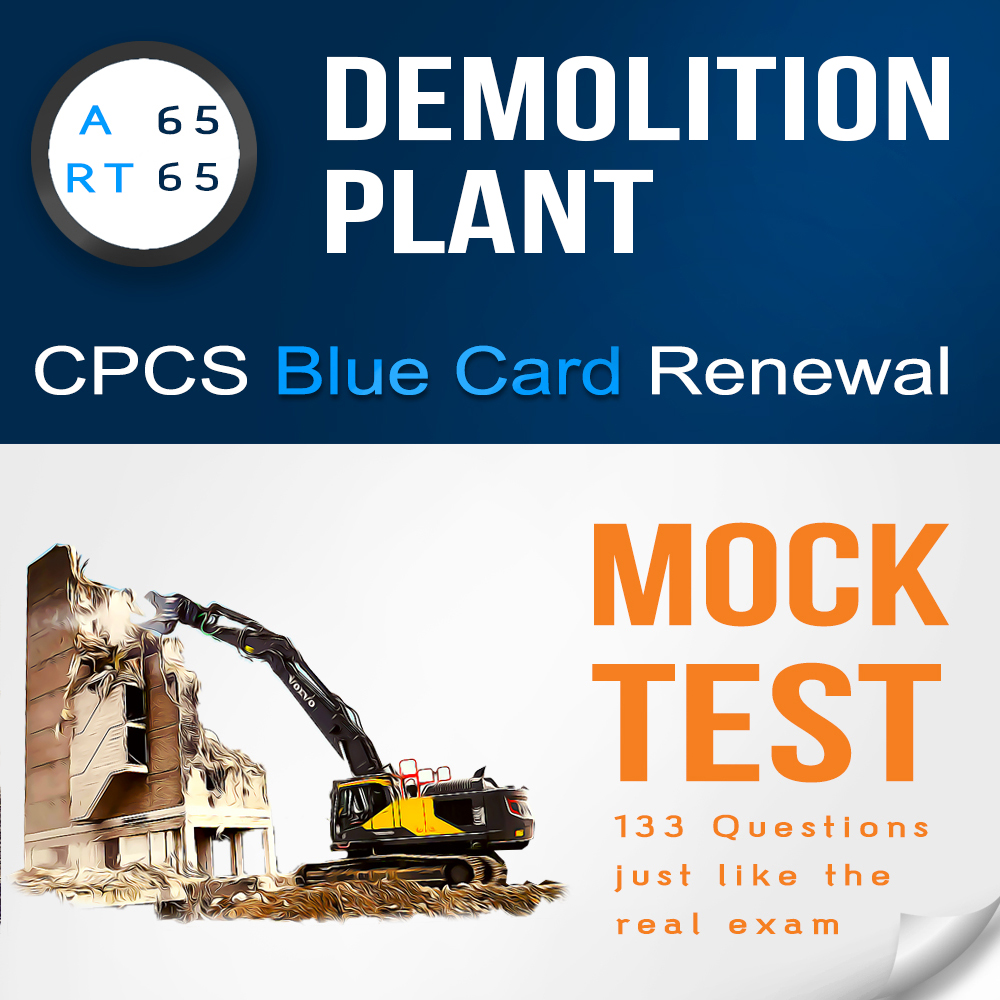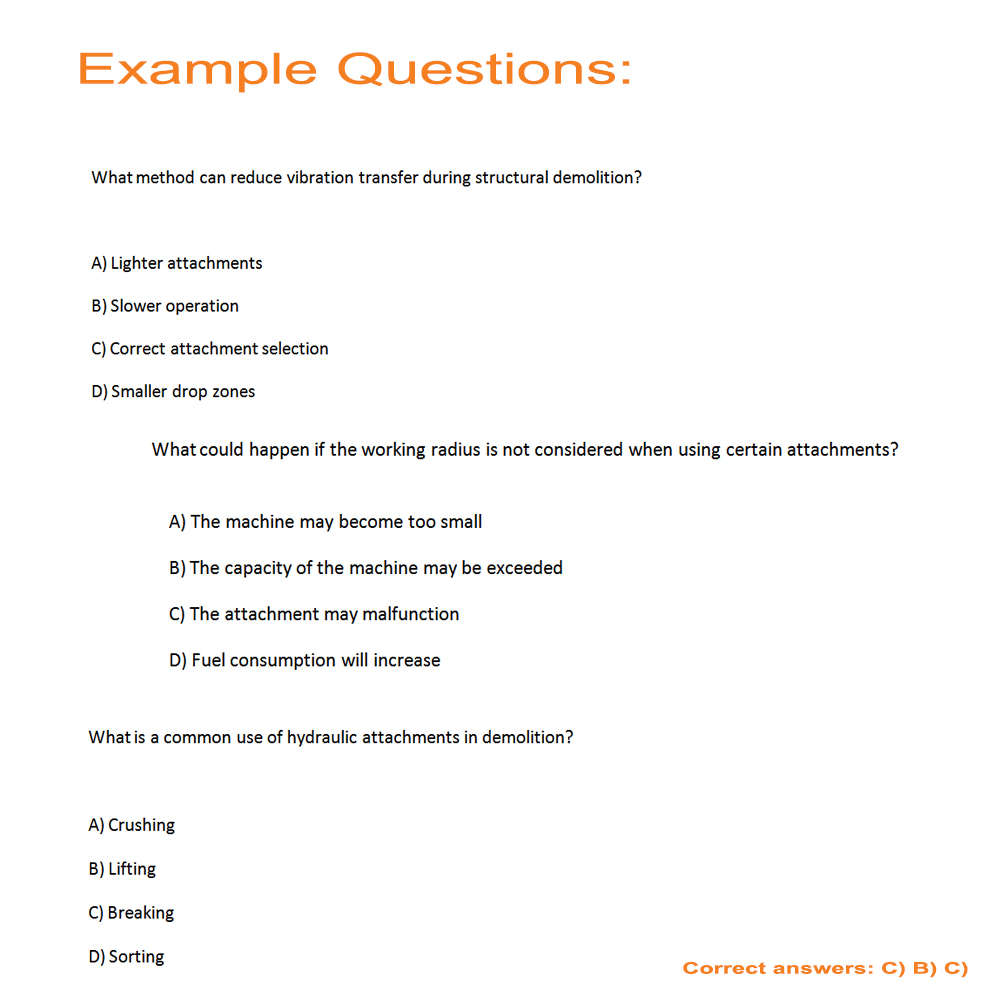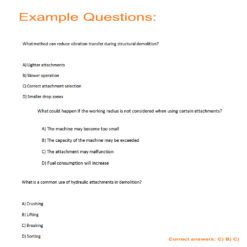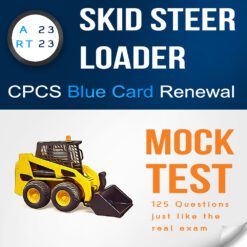RT65 CPCS Blue Card Renewal Mock Test with 133 Questions and Answers / A65 Demolition Plant
£15.00 Original price was: £15.00.£9.95Current price is: £9.95.
100% PASS your RT 65 CPCS blue card renewal test with practice multiple choice questions – Just like the real NOCN/CPCS test!
- Questions & Answers: based on the latest RT 65 Demolition Plant – CPCS Renewal Test Revision FACTSHEET
- Category: A 65 – Demolition Plant
- Number of Multiple-choice Questions: 133
- Format: PDF
- Delivery time: Instant download after checkout
- Refunds: No refunds once downloaded, unless you ordered duplicates by mistake.
If there are any issues with your download, please email CardRenewalTest@gmail.com and we’ll send it ASAP
Ace Your RT 65 Demolition Plant CPCS Blue Card Renewal with Mock Practice Tests
Are you gearing up for your RT65 Demolition Plant CPCS Blue Card Renewal? If so, you’re probably aware that the renewal process requires a thorough understanding of the latest industry standards and safety protocols. To ensure your success, you need to be well-prepared, and that’s where our CPCS Blue Card Renewal Mock Practice Tests come into play.
The Key to CPCS Blue Card Renewal Success
Renewing your CPCS Blue Card is not just a formality; it’s an assurance of your competence and commitment to safety in the demolition industry. The NOCN Renewal Test (RT65) evaluates your knowledge of the most up-to-date Demolition plant factsheet and regulations, ensuring that you’re well-prepared for the challenges of the job.
Our Mock Practice Tests are designed to be your secret weapon in acing the renewal process. Here’s why you need them:
Stay Current: The demolition industry is constantly evolving, with new safety measures and best practices being introduced. Our mock tests are based on the latest NOCN factsheet, keeping you up-to-date with the industry’s requirements.
Boost Your Confidence: Practice makes perfect, and that’s particularly true when it comes to tests. Our mock tests help you become familiar with the format and style of questions you’ll encounter in the actual NOCN Renewal Test, boosting your confidence on test day.
Identify Weaknesses: Our mock tests highlight your areas of weakness, allowing you to focus your study efforts where they’re needed most. This targeted approach ensures that you’re making the most of your study time.
What You’ll Gain from Our Mock Practice Tests
Our CPCS Blue Card Renewal Mock Practice Tests are more than just questions and answers; they’re a comprehensive tool to help you succeed. Here’s what you’ll gain:
In-Depth Knowledge: Our questions cover a wide range of topics, mirroring the content of the NOCN Renewal Test. You’ll gain a deep understanding of crucial concepts and regulations.
Realistic Exam Experience: The format and difficulty level of our mock tests closely mimic the actual NOCN Renewal Test. This realistic experience prepares you for what to expect on test day.
Your Path to Passing the NOCN Renewal Test
Renewing your CPCS Blue Card is an important step in your career, and we’re here to ensure your success. Our CPCS Blue Card Renewal Mock Practice Tests are the perfect resource to help you prepare effectively and efficiently.
Don’t leave your renewal to chance. Invest in your future and your safety by using our mock tests to sharpen your knowledge and skills. With these practice tests, you’ll be well-prepared to pass the NOCN Renewal Test with flying colors.
Get started today and take a significant step towards securing your RT65 Demolition Plant CPCS Blue Card renewal. Book your mock practice tests now and embark on your journey towards success in the demolition industry.
Mastering Demolition Plant Operations and Safety: Your Roadmap to Success
Demolition plant operators play a crucial role in the construction industry, ensuring the safe and efficient removal of structures. To excel in this field, operators need a deep understanding of the latest industry standards and safety protocols. This comprehensive guide outlines key learning points from the latest NOCN RT65 Demolition plant factsheet, providing essential knowledge for both experienced professionals and those seeking CPCS Blue Card Renewal.
Demolition Plant Preparation:
- Correct Preparation is Essential: Before commencing work, thorough preparation is crucial. Failing to inspect the machine properly can lead to incidents, impacting both performance and safety.
- Reporting Defects: Operators should promptly report any defects, regardless of their perceived severity. Neglecting minor issues could result in severe consequences.
- Attachment Awareness: Many demolition machines use various attachments. Operators must communicate clearly with assistants to prevent sudden movements during attachment changes.
- Hydraulic Oil Safety: When disconnecting oil lines, operators should be cautious of high temperatures and follow manufacturer procedures to release hydraulic pressure safely.
Attachment Handling Safety:
- Visual Alignment: When aligning pin holes between attachments and the machine’s dipper arm, it should only be done visually. Keep limbs away to prevent injuries.
- Operator Responsibility: Operators maintain responsibility for attachment removal and reattachment, even with the assistance of others.
- Quick Hitch Couplers: Quick hitch couplers are common, but attachments can unintentionally detach if not properly secured. Operators must ensure latches and safety pins are fully engaged.
- Hydraulic Pressure: Operators using fully automatic quick hitch couplers must immediately apply full hydraulic pressure to the coupler’s locking system.
Demolishing Safely and Working with Others:
- Safety Priority: Safety is paramount in the demolition industry, with proper planning crucial to preventing incidents and accidents.
- Slope Caution: When accessing sloped working areas, operators must exercise caution to avoid traction loss and machine sliding.
- Proper Alignment: Positioning the boom over the front of the tracks enhances stability, a vital aspect of safe operation.
- Ground Investigation: Conduct ground investigations to ensure it can support the machine’s weight and materials.
- Ongoing Checks: Regular checks during work, especially on environmental factors like wind speed, are essential to prevent accidents and additional cleanup time.
- Control Measures: Implement control measures to restrict access to the demolition zone, allowing only authorized personnel and equipment.
- Material Separation: Clearly separate retained sections from those to be demolished to prevent damage.
- Hydraulic Oil Precautions: Take precautions when hydraulic oil lines catch or snag, and address the issue promptly to avoid accidents.
- Working Radius Awareness: Understand the required working radius to prevent machine instability.
- Vibration Control: Minimize vibration transfer to adjacent structures by selecting the appropriate attachment.
- Hydraulic Breakers: Properly vary the point of impact with hydraulic breakers to work efficiently and safely.
- Efficient Planning: Effective planning and efficient work completion enhance project safety and profitability.
- Fuel Efficiency: Operators can reduce fuel consumption by understanding electronic working modes and switching off the engine during breaks.
Working at Height and in Restricted Areas:
- Diverse Challenges: Smaller demolition plant variants operate in confined spaces and at height, presenting unique challenges.
- Edge Protection: Proper edge protection is essential when working at height to prevent falls.
- Operator Vigilance: Operators must be vigilant, especially in confined areas, and follow safe work systems diligently.
- Platform Size: Raised temporary platforms should exceed the machine’s track frame dimensions, and ongoing checks are needed for erosion prevention.
- Ventilation Considerations: In deep structures, ventilation must be addressed to prevent overheating and exhaust gas build-up.
- Safety Priorities: Falls from height and collisions with plant equipment are recognized as leading causes of fatal accidents.
- Clear Work Area: Operators must ensure the work area is clear of personnel before machine movement.
Conclusion:
Mastering the art of demolition plant operations and safety requires a comprehensive understanding of key principles and practices. This guide highlights crucial points from the latest NOCN factsheet, offering a roadmap to success for both experienced operators and those pursuing CPCS Blue Card Renewal. By applying these lessons, you’ll contribute to a safer and more efficient demolition industry.
2 reviews for RT65 CPCS Blue Card Renewal Mock Test with 133 Questions and Answers / A65 Demolition Plant
Add a review Cancel reply
Related products
CPCS Blue Card Renewal Tests
RT40 CPCS Blue Card Renewal Mock Test with 139 Questions and Answers / A40 Slinger Signaller
CPCS Blue Card Renewal Tests
RT66 CPCS Blue Card Renewal Mock Test with 133 Questions and Answers / A66 Compact Crane
CPCS Blue Card Renewal Tests
RT41 CPCS Blue Card Renewal Mock Test with 118 Questions and Answers / A41 Loader Compressor
CPCS Blue Card Renewal Tests
CPCS Blue Card Renewal Tests
RT33 CPCS Blue Card Renewal Mock Test with 129 Questions and Answers / A33 Agricultural Tractor
CPCS Blue Card Renewal Tests
RT23 CPCS Blue Card Renewal Mock Test with 125 Questions and Answers / A23 Skid Steer Loader
CPCS Blue Card Renewal Tests
RT19 CPCS Blue Card Renewal Mock Test with 123 Questions and Answers / A19 Grader
CPCS Blue Card Renewal Tests
RT42 CPCS Blue Card Renewal Mock Test with 117 Questions and Answers / A42 Crusher

















Matt –
good material mate i didnt find anything like this anywhere. Cheers
James Pembroke –
A comprehensive compilation of test questions for the demolition plant with a notable emphasis on diverse topics. However a few questions lack clarity and may benefit from revision.